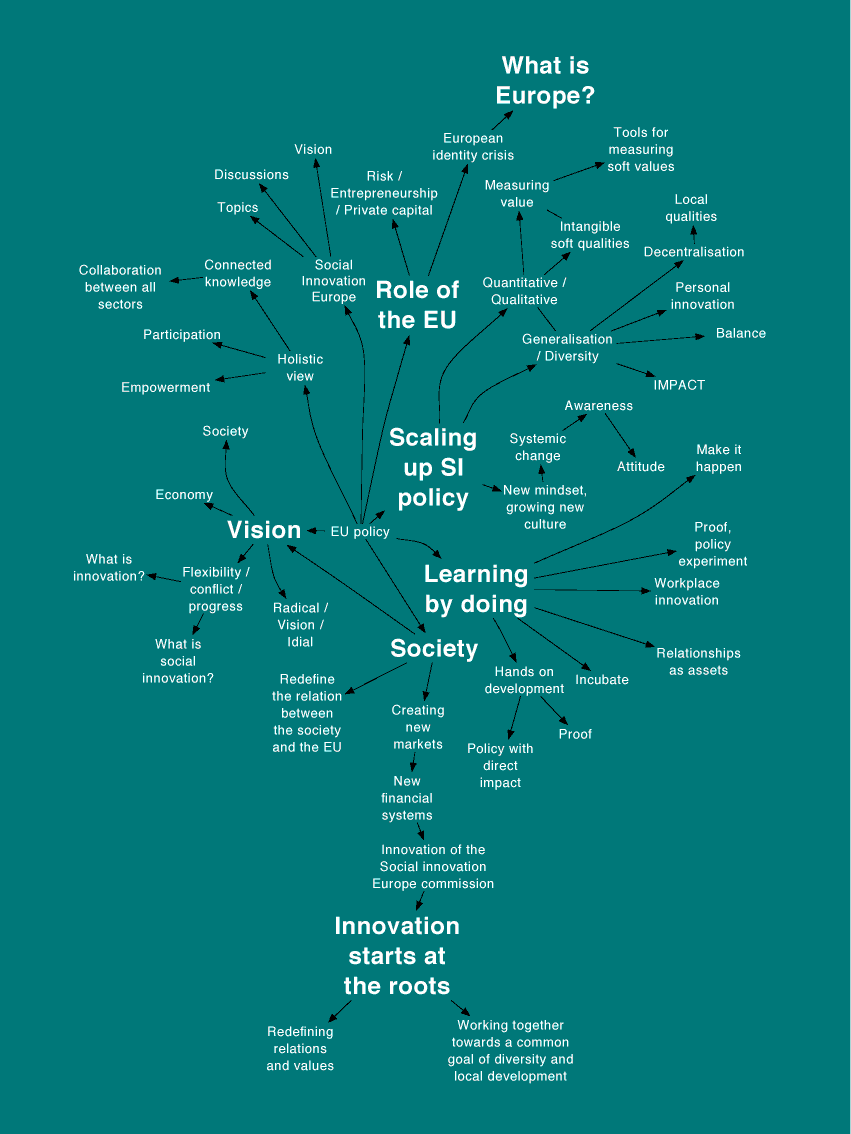Notes from the EU conference on Social Innovation, 16-17 March 2011, Brussels
Last month we attended the EU social innovation conference in Brussels, a great two day conference filled with discussion, interaction and the building up of new relations. We enjoyed talks by Geoff Mullgan of the Young Foundation, Diago Vasconcelos of SISCO, Social Innovation eXchange SIX, Barbara Eros the Strategic program director of DemNet, José Manuel Barroso the President of the European commission and many others. Throughout the program different perspectives from policy making and practitioners were addressed together with the possibility to join workshops and exchange perspectives.
Among others we very much enjoyed the talks of Geoff Mullgan from Young Foundation, Diago Vasconcelos of CISCO, Social Innovation eXchange SIX, Barbara Eros from DemNet and José Manuel Barroso_President of the European Commission. Throughout the program different perspectives from policy making and practitioners were addressed together with the possibility to join workshops and exchange perspectives.

Creating a new scale
Many of the talks given during the conference raised questions about the representation of social innovation by numbers and the concept of scaling up of social innovation to make it accessible for more people. These topics connected much of the content of the two days together and made us rethink what is understood by social innovation or even by innovation in itself? This notion triggered lots of questions and discussion on our side, what about the meaning of the human factor and the soft qualities embedded in innovation? What are the awareness and feelings of the public who have to practice the created ideas on social innovation?
Do we know what the real needs and real questions are and can we address them to make workable propositions from a human perspective? The deeper meaning of ‘social’ in social innovation, is there a need for diversity? Social innovation is still often talked about in a rather technical way and does not differ a lot from a financial report, missing meaning and the connection to a real understanding of living, mostly created through statistics without the ability to show the value of soft qualities. Can we enable social innovation to create these insights into new ways of measuring with both human and economic profit?
The European Commission can take a very important and leading role in the development of social innovation. There is a even a greater potential when we try to connect the identity of the European Union to it’s vision on social innovation. This relations opens up much bigger perspective on social and economic issues that try to answer to the question of how we are building our future society.
The quality of diversity
There is a need to measure, we need to measure impact and progress. With the introduction of social innovation, we have to consider to adjust our tools for measuring. A new scale to enrich the numbers and to open up insights in the economics of people, creating a balance in which the value of people and their welfare is our main asset. To start we have to create a vision, develop a theoretical and philosophical framework to work from to be able to form a hands on way to grow a new culture for innovation, an empathic society. From vision creation to financial systems and workplace innovation, there is a need for a paradigm shift.
As Local Intelligence we want help trigger this process, to be in this dialogue with you on developing new sets of practical tools to work, research and measure. Tools that enables sectors, organizations and local governments to activate a new set of values. With the diversity Europe hosts in it’s culture as a strength, create awareness, understanding and practical implementation. We can establish a common perception on social innovation and scaling up by acknowledging and practising the local ingenuity that Europe inhabits. Research the potential and impact of soft skills that enhance a local but European vision. Making social innovation the core for evolving our society in new directions, creating a livable Europe, a place for people to work and live together, harvesting new futures.
Core points that we formed from the conference;
– How can we bridge the theoretical and the practical, the technical and the ideal framework within social innovation. Can we create a policy that is practised? A learning-by-doing policy making with the help of creative and critical thinkers and building policy prototypes and test situations in real life scenario’s.
– In which way can the European Commission practice social innovation !? It is about creating a better quality of life but also about a new kind of cultural awareness that deals with change, local quality and invention. How can the European Commission help to enable social innovation from within and start growing a new culture?
– What does it mean being a member, a inhabitant of the European Union ? Social Innovation is also part of finding a vision and identity that fits the EU and brings together a spirit of working together to make changes and to work towards the big challenges we face today.
– How can we enable a collaboration between the creative industries and policy making? An investigation to the role of different parties including specialists and creatives to work together on policy level. A multidisciplinary and multi sectorial collaboration.
– The scaling up of social innovation and policy has been one of the returning topics throughout the conference. How to do it and how to start talking about soft values next to the technical qualities and statistics. The measuring tools for soft values and qualities need to be developed. Finding the balance between diversity and generalisation in scaling up.

